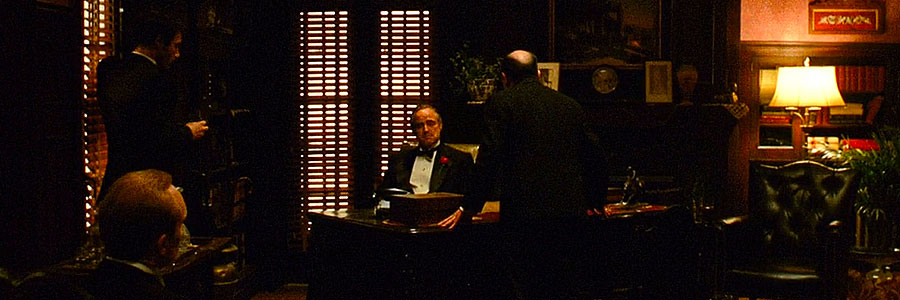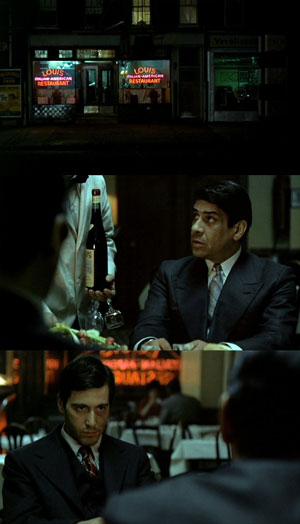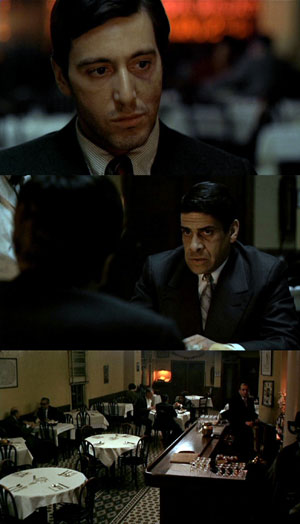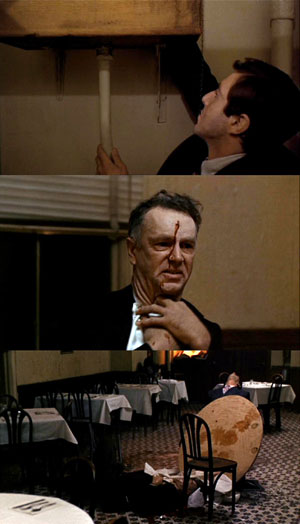
The Godfather
Paramount Pictures
Original release: March 15th, 1972
Running time: 175 minutes
Director: Francis Ford Coppola
WriterS: Mario Puzo, Francis Ford Coppola, Mario Puzo
ComposerS: Nino Rota, Carmine Coppola
Cast: Marlon Brando, Al Pacino, James Caan, Robert Duvall, Diane Keaton
Louis’ Restaurant 01:20:00 to 01:25:50
Deconstructing Cinema: One Scene At A Time, the complete series so far

Father and Son. Family. Love. Loyalty. Hope. Expectation. Destiny.
All of these concepts are the foundations upon which Francis Ford Coppola’s stunning The Godfather Trilogy are built. Yes, I’m including the third film in that judgment, because despite its (many) faults, to me, it still stands as an epic, a moving drama and worthy conclusion to the heart of the trilogy: the tragic life story of Michael Corleone. Granted, I’m probably biased in my assessment of the third film: my opinion being colored by the memories of the experience I had for my first viewing.
As I imagine is the case for many men in my age group, The Godfather films were “handed down” to me by my Father. Having experienced the genius of first two instalments in theaters when he was a younger man (and probably also partially because of our Italian heritage), my Father was a Godfather devotee. So, naturally, when I finally reached the age in which it was “appropriate” to share the films with me, he did so. It always seemed to me it wasn’t just his pleasure to be sharing these great films, but also his duty. Maybe I’m just imaging that second aspect (or perhaps I’m letting the current subject matter infiltrate my writing, therefore lending a sense of melodrama to the proceedings), but…it always felt to me that this was the case.
So my Father introduced me to The Godfather. And on Christmas Day, 1990, after the requisite morning gift exchange, my Father and I said goodbye to my Mother and Sister and headed to the multiplex to catch the first showing (local premiere) of the final instalment of the Corleone saga.
Like many before and after us, my Father and I have a very…”complicated” history. Things between us haven’t always been as My Three Sons as they were for many other people I knew. But one thing that always brought us together was our common love for the Godfather films. So, because of this shared love, because it was one of the rare moments alone with my Father in which we shared something we both truly loved, because we were sharing not just a Godfather film viewing but a new Godfather film viewing, that memory will always be one of the fondest cinema experiences of my life.

But don’t worry…I’m not going to deconstruct a scene from The Godfather, Part III. No, my article deals with the original, and in my humble opinion, best film in the trilogy. The original.
The Godfather.
Just seeing those words written there makes me very aware of the hubris of taking on this assignment. In fact, about a week after I agreed to do so, I thought of the task as a smile faded from my lips, and I said aloud, “I’m so screwed.” This has been done a thousand times before and probably hundreds of times better than I can.
But, alas…here I am…discussing the journey of Michael Corleone.
A journey that begins not when we see his entrance in the film as a decorated, handsome, fresh- faced and somewhat naïve war veteran, but when we join him in the dining room of Louis’ Italian-American Restaurant in the Bronx… during those moments when he truly starts down the path towards his one true destiny and into a life from which he will never escape. Those moments of tortured introspection in which we can see Michael weighing everything he is and was against everything he might, could, and probably will be, depending on the choice he makes.
During those moments, is Michael thinking about his own lost hopes for the future? Is he contemplating the fight he had with his family on his Father’s birthday only a few years before…when he revealed that he joined the US Marines in the fight against the Axis of Evil? When his brothers, Sonny and Tom, express their disappointment at what they regarded as essentially Michael’s betrayal of his family- his Father -to pursue his own path: “I didn’t ask for deferment. I didn’t want it. I have my own plans for my future”?
Surely he looks back on the promise he made to his love, Kay, during his sister’s wedding: “That’s my Father, Kay, that’s not me”.
Perhaps he remembers the powerful love for his barely-conscious and ailing Father that caused him to give a somewhat veiled and yet solemn, heartfelt promise at the hospital: “I’m with you now, Pop”.
Maybe he looks into the future and sees something similar to the discussion he has with his Father in the vineyard: the point where Michael and Vito discuss their own personal expectations for Michael’s future. The moment his Father reveals directly to Michael: “I never wanted any of this for you. I worked my whole life…to take care of my family. And I refused to be a fool…dancing on a string held by all those…big shots. But I thought…that when it was your turn…that you would be the one to hold the  strings. Senator Corleone. Governor Corleone. There just wasn’t enough time, Michael. There just wasn’t enough time.” And to which Michael responds, “We’ll get there, Pop. We’ll get there.”
strings. Senator Corleone. Governor Corleone. There just wasn’t enough time, Michael. There just wasn’t enough time.” And to which Michael responds, “We’ll get there, Pop. We’ll get there.”
It’s also conceivable that rather than thinking of specific moments in time, Michael’s instead thinking in broad generalities about certain concepts of life…of what’s lead him to this point.
The Father/Son dynamic: maybe now, in the moments before the violence that will drastically alter his fate, he finally understands why his Father is who he is…and why he made the choices he did. Michael is acting out of an instinct to protect those he loves: his family, and more specifically, his Father. Does Michael finally understand that, while not justified, maybe the choices that made Vito into the monster Michael viewed him as before were made out of love…out of a desire to shield and provide for those Vito cared about most?
Does that lead him to think fleetingly about family…about how his decision to kill two men in cold blood is being made in the interest of people other than him? Does he think about how the only way to save his family is to betray what he believed was his own moral, inner compass?
During these distressed moments, it’s conceivable that Michael at last comes to an understanding of the concept of loyalty. Yet how does he come to the point where he allows loyalty to his family to override loyalty to who he thought he was and would be?
More than likely, all of these things and more are ideas, memories and concepts that are filling the mind of Michael Corleone during these agonizing moments. And through Al Pacino’s remarkable performance, we see all of these things and more in Michael’s eyes and on his face. For those familiar with the heartbreaking story of  Michael Corleone, the build-up to the violence is, perhaps, even more painful to watch than the coming graphic violence itself. Because we’ve seen everything Michael is seeing in his own mind. We’re familiar with his history. We’ve felt his pain. And we realize his inexorable destiny.
Michael Corleone, the build-up to the violence is, perhaps, even more painful to watch than the coming graphic violence itself. Because we’ve seen everything Michael is seeing in his own mind. We’re familiar with his history. We’ve felt his pain. And we realize his inexorable destiny.
Ironically, Michael’s history and destiny is seen by some as a symbolic morality tale of the perceived decline of America itself. Citing the coinciding of Michael’s history with generation- shaping/defining moments in American history such as World War II, the Cold War, and Vietnam, author Tony Nourmand says, “Michael’s damnation, therefore, can be seen as a reflection of the loss of America’s own moral compass.” ¹
Regardless of the symbolism, and even if a viewer isn’t intimately familiar with the story of Michael Corleone, one is still able to understand the torture Michael is feeling in those moments because each of us has most likely experienced a similar situation at some time in our lives. And for those who have, we’ve all felt that moment of reckoning before we made a choice that would alter not just our lives, but the lives of many people, whether they be family, friends, or complete strangers. In those moments, surely most of us have contemplated the past, present, and future before committing to that choice as well as thought in vague generalities of the concepts that define our lives and our fortunes by making these choices.
I remember when I revealed to my parents that I wanted to become and actor and filmmaker rather than a classical percussionist and musician. I was essentially abandoning and turning my back on years of training, education and experience in one field to take up another field in which I’d very little experience and training in. It was one of the most difficult moments of my life and I knew that the potential fallout could’ve been emotionally devastating for all involved.
The choice we make inevitably defines our lives and characters in one or many ways. For Michael, it was the true beginning of his journey into a darkness that would consume his entire existence. And despite his reasons for doing so, regardless of the fact that Michael believed the greater good justified the decisions …each and every one of the choices he made from that point on would continue to plunge him further into his own personal mire.
- [1] Nourmand, Tony The Godfather: An Unofficial Look at Francis Ford Coopola’s American Classics (2007), edited by Tony Nourmand, published by Westbourne Press Ltd. and Barnes and Noble
Until Michael finally looks back on his own history and realizes…the Son became a more tainted version of the Father. The man who believes he acted out of loyalty and love finally discovers that by betraying himself to begin with…by choosing in those moments in Louis’ Restaurant to compromise who he was…by making that one choice at that specific moment in time…he ended up losing his family.
The man who had such great hopes and expectations for his future ultimately realizes…his fate was shaped by those moments leading up to a choice made with nothing but the best of intentions…but one that was tragically a betrayal of who he really was.

Lito Velasco
Lito is an actor, composer, producer and music supervisor (read our interview on Scream - The Inside Story here).
In his own words:
"I'm a SAG actor and reforming musician who lives in the "hub" of the entertainment industry; Los Angeles. It's a tough gig trying to get a foot into the door of the business...but, there's nothing I love more in life than the creative process of acting and performing. Whether it's paying homage to already existing characters, doing impressions, or creating a character on my own...acting is something that fulfills me in a way that nothing else ever has. So, even though it seems that every day brings new rejections and that I hear the word "no" now more than I ever have before...I carry on with my quest in hopes of attaining my goal; to become a steadily working actor."
© 2022 STATIC MASS EMPORIUM . All Rights Reserved. Powered by METATEMPUS | creative.timeless.personal. | DISCLAIMER, TERMS & CONDITIONS
HOME | ABOUT | CONTACT | TWITTER | GOOGLE+ | FACEBOOK | TUMBLR | YOUTUBE | RSS FEED
CINEMA REVIEWS | BLU-RAY & DVD | THE EMPORIUM | DOCUMENTARIES | WORLD CINEMA | CULT MOVIES | INDIAN CINEMA | EARLY CINEMA
MOVIE CLASSICS | DECONSTRUCTING CINEMA | SOUNDTRACKS | INTERVIEWS | THE DIRECTOR’S CHAIR | JAPANESE CINEMA





